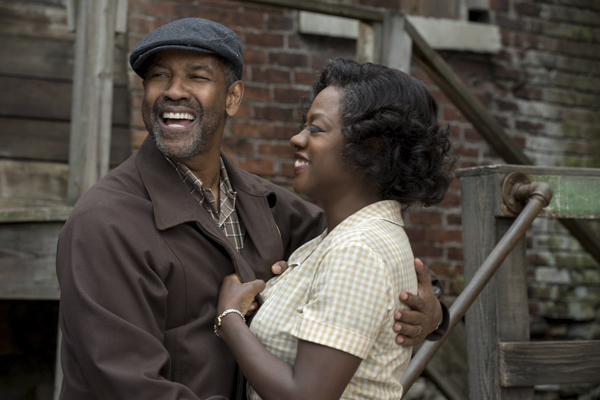![]() Fences is a classic, not just as a Tony and Pulitzer Prize–winning play, the 1950s-set chapter in the late August Wilson’s monumental 10-play “The American Century Cycle,” one for each decade of the African American 20th century experience.
Fences is a classic, not just as a Tony and Pulitzer Prize–winning play, the 1950s-set chapter in the late August Wilson’s monumental 10-play “The American Century Cycle,” one for each decade of the African American 20th century experience.
This Fences is a classic family drama, not just because it is the first feature film version from Wilson’s oeuvre, with a screenplay he himself adapted. (The Piano Lesson, Wilson’s 1930’s entry, was a superb, Emmy-nominated Hallmark Hall of Fame TV special in 1995.) The stellar adult cast perfected these same roles in a 2010 Tony-winning Broadway revival: Denzel Washington as voluble patriarch Troy Maxson, the bitter, ex-baseball player, ex-con, and ambitious sanitation worker; Viola Davis as his loving wife Rose, who he pushes past the limits of her patience; Stephen McKinley Henderson as his co-worker and disapproving best friend Jim Bono; Russell Hornsby as his estranged, jazz musician son Lyons; and Mykelti Williamson as his war-damaged, angelic brother Gabriel.
The fences here are in the actual Pittsburgh neighborhood where Wilson grew up and the play takes place. But the setting has now been opened up as Troy rides on the back of the sanitation truck and walks through the neighborhood with his pocket full of Friday night pay, his arms full of groceries and a fresh bottle of gin. While the play is restricted to the backyard, the film follows Rose into her warm and scrubbed domain inside the narrow, brick home, the type working-class families strived for when they worked in the factories, whose furnaces are seen spewing into the air. David Gropman’s production design is so filled with period detail—faithful to Charles “Teenie” Harris’s photographs of the area—that he’s getting overlooked in award season as viewers perhaps assume the (redeveloped) Hill District still looks this way.
The family tensions are specific to African American history and as universal as Shakespeare. While today’s Black History Month celebrates Jackie Robinson’s exceptionalism, graying Troy in 1957 nurses resentments. Though he, too, triumphed in the Negro Leagues, he just missed the opportunity to crossover, and he blocks his younger son Cory (Jovan Adepo, somewhat overpowered in his studio feature film debut) from even trying to get a football scholarship, no matter how much Rose tries to convince him. (“The white man ain’t gonna let him get nowhere with that football.”) Troy’s stubbornness helps him gain a promotion at work, but his monologues of frustration become more drunkenly domineering over his sons, wife, and friend as he seeks diversion elsewhere, with lasting repercussions.
Washington’s direction, with intimate camerawork by Charlotte Bruus Christensen, makes each monologue, especially Troy’s, an interactive dialogue between him and the other characters, who bring the emotional context. The director’s fluidity with this classic, his third helming, recalls Laurence Olivier’s directing and starring in Shakespeare, with Washington showcasing the poetic, vernacular language, what frequent Wilson interpreter Henderson calls “blues iambic.” Davis’s solo declaration is as devastating as Rose is heartbreaking: “Don’t you think I ever wanted other things? Don’t you think I had dreams and hopes?” She is also utterly believable when Rose turns her heart inside out to find more love.
Fences whets our appetites for when the rest of Wilson’s plays can receive this deserved treatment, for the wider appreciation of a great playwright and the long-needed chance for more African American actors to indelibly commit such rich characters to multidimensional life.







Leave A Comment